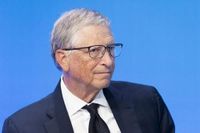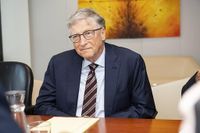NEW YORK — On May 8, 2025, Bill Gates announced a groundbreaking commitment to donate nearly all of his personal wealth by 2045, pledging $200 billion through the Bill & Melinda Gates Foundation. This announcement coincides with the foundation’s 25th anniversary, marking a significant shift in Gates' philanthropic strategy. In a pointed speech, the Microsoft co-founder emphasized the urgency of global issues, stating, "The problems are urgent, and the time to act is now." He expressed that there are too many pressing challenges to justify holding onto resources that could be utilized to help people in need.
Gates outlined plans to accelerate the foundation’s spending, with an annual budget projected to grow to $9 billion by 2026 and reach approximately $10 billion each year thereafter. Ultimately, he aims for the foundation to spend down 99 percent of his fortune, which is currently estimated at $108 billion, depending on market conditions and inflation. This ambitious initiative will target critical areas, including the eradication of polio and malaria, the prevention of deaths among women and children, and the fight against poverty.
However, Gates' announcement comes at a time of concern regarding U.S. foreign aid. He warned that significant cuts to foreign assistance could reverse decades of progress in health and development. The Trump administration's ongoing reductions to the budget of the U.S. Agency for International Development (USAID) have raised alarms, with reports indicating that over 80 percent of USAID’s $44 billion budget is on the chopping block. Elon Musk, who heads the newly created Department of Government Efficiency (DOGE), has been overseeing these cuts and has publicly criticized USAID, even stating he fed it "into the wood chipper."
In response to Musk's harsh rhetoric, Gates condemned the actions and statements, asserting that they undermine vital programs in some of the world's poorest regions. Gates remarked, "The image of the world’s richest man killing the world’s poorest children is not a pretty one," and added, "As brilliant as Elon is, I actually know more about USAID than he does. I’ve been to Nigeria, to the DRC. I’ve seen firsthand the work they do. These people are heroes." His comments reflect a deep concern for the impact of U.S. policy on global health initiatives.
Despite the challenges, Gates remains hopeful about the future of U.S. foreign aid. He has met with President Trump twice since the latter's return to office and expressed a desire for the administration to consider less drastic reductions. "If we’re able to get to something like a 15 to 20 percent cut, then we can be smart about which programs to protect," he stated. "But eliminating entire initiatives? That would be tragic."
The Gates Foundation, established in 2000, has disbursed over $100 billion to date, supporting global health initiatives through partnerships with organizations like Gavi, the Vaccine Alliance, and the Global Fund to Fight AIDS, Tuberculosis, and Malaria. However, it has faced criticism for its influence in global health governance, particularly in shaping priorities at the World Health Organization.
In a broader context, Gates' commitment to philanthropy reflects a growing trend among the world's wealthiest individuals to contribute significantly to charitable causes. He has been a proponent of the Giving Pledge, an initiative launched in 2010 that encourages billionaires to commit the majority of their wealth to philanthropy during their lifetimes or in their wills. To date, over 240 individuals have signed the pledge.
Interestingly, Gates plans to leave his three children with less than 1 percent of his vast fortune, which translates to millions per child but is a surprisingly small fraction of what he could give. He explained his reasoning during a recent interview, stating, "It wouldn't be a favor to them." Gates believes that providing his children with a massive inheritance could undermine their ability to achieve their own success and develop their own identities.
He emphasized the importance of allowing his children the freedom to forge their own paths, saying, "I want to give them a chance to have their own earnings and success, be significant and not overshadowed by the incredible luck and good fortune I had." This philosophy underlines Gates' view that wealth should be a tool for societal benefit rather than a means to create dynasties.
As of April 2025, Gates' net worth is estimated at $107.7 billion, making him one of the wealthiest individuals globally. The Gates Foundation holds an endowment of $75.2 billion as of December 2023. Notably, Warren Buffett, a longtime friend of Gates, has contributed over $39 billion to the foundation since 2006, bolstering its capacity to address critical global issues.
Gates concluded his announcement with a personal reflection on his journey, stating, "I have come a long way since I was just a kid starting a software company with my friend from middle school. I hope others with wealth will also consider what they can do—because this is one of the most impactful ways to give back to society." His remarks resonate with a call to action for the wealthy to consider their role in addressing pressing global challenges.
As Gates embarks on this ambitious philanthropic endeavor, the world watches closely. The implications of his commitment could reshape not only the landscape of global health and poverty alleviation but also set a precedent for how billionaires approach their wealth and its potential impact on society.



